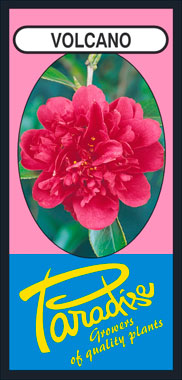Scarlet red flowers 11cm in diameter of a high anemone form. A fast grower with shiny dark green leaves, blooms early to late season.
Miniature Hybrid camellias can be grown Australia wide. They are tolerant of both heat and light frost, but will need some protection in extreme situations, especially while young.
Informal screening
Feature shrub
Container displays
Topiary
- Bird Attracting
- Borders
- Containers
- Exotic
- Fragrance
- Hedging
- Scented Flowers
- Screening
- Shrubs
- Standard
- Topiary
Full sun to light shade
Soil pH should be neutral to moderately acidic. Poor or heavy soils should be improved with plenty of decomposed organic matter prior to planting and raised beds are recommended for areas with heavy clay soils.
Miniature Hybrid Camellias require good drainage and are intolerant of heavy, water logged or clay soils.
1m apart for a hedge or border.
Planting holes should be approximately twice the width and depth of the pot to be planted and back filled with top soil improved with organic matter.
During establishment period deep watering is recommended to encourage a deep root system.
Staking young plants can help to support plants as they establish.
Once established Camellias have a low water requirement however regular irrigation is needed during the first 3 - 6 months, soil should be kept moist but not water logged. Watering can be slowly reduced as plants establish and begin to grow strongly.
Mulching is necessary to reduce moisture loss from the soil and to insulate surface roots from extremes of temperature. Mulch should stop at least 5 -10cm from the stem of the plant as it can lead to an increase in pest and disease problems if in direct contact.
Mini Hybrid Camellias are have a natural arching habit. If needed pruning is best done in late winter or early spring.
Plants should be fed in spring and summer with a high quality complete fertiliser.
 Look out for this label in all good garden centres.
Look out for this label in all good garden centres.